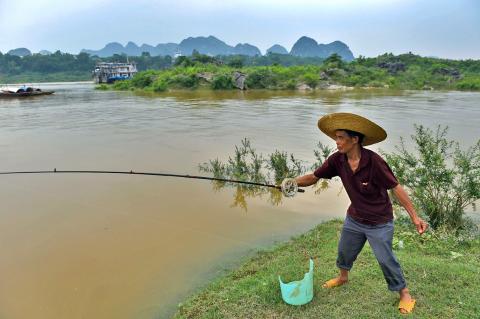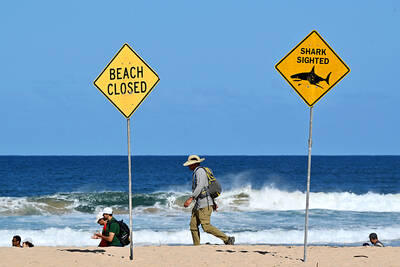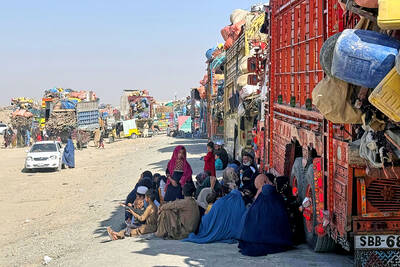At the height of the frenzy of the Cultural Revolution, victims were eaten at macabre “flesh banquets,” but 50 years after the turmoil began the Chinese Communist Party (CCP) is suppressing remembrance and historical reckoning of the era and its excesses.
Launched by Mao Zedong (毛澤東) in 1966 to topple his political enemies after the failure of the Great Leap Forward, the Cultural Revolution saw a decade of violence and destruction nationwide as party-led class conflict devolved into social chaos.
Teenaged Red Guards beat their teachers to death for being “counter-revolutionaries” and family members denounced one another, while factions clashed bitterly for control across the nation.

Photo: AFP
However, the Chinese Communist Party — which long ago decided that Mao was “70 percent right and 30 percent wrong” — does not allow full discussion of the events and responsibility.
Some of the worst excesses happened in Wuxuan, in the far southern region of Guangxi, where the hearts, livers and genitals of victims were cut out and fed to revelers.
Now, five decades after the declaration of the Cultural Revolution on May 16, 1966, the town has frozen yoghurt shops, men fish a river beneath mossy limestone karsts and red banners hang from trees proclaiming the ruling party’s dedication to the people.
Some residents say they have never heard of the dozens of acts of cannibalism, motivated by political hatred rather than hunger, that once stained the streets with blood.
At least 38 people were eaten in Wuxuan, a high-ranking member of an early 1980s official investigation said, asking not to be named for fear of repercussions.
“All the cannibalism was due to class struggle being whipped up and was used to express a kind of hatred,” he said. “The murder was ghastly, worse than beasts.”
Academics say the violence resulted from Wuxuan’s remote location, the ruthless regional CCP leader, poverty and bitter factionalism.
“In 10 years of catastrophe, Guangxi not only saw numerous deaths, they were also of appalling cruelty and viciousness,” the retired cadre wrote in an unpublished manuscript. “There were beheadings, beatings, live burials, stonings, drownings, boilings, group slaughters, disembowellings, digging out hearts, livers, genitals, slicing off flesh, blowing up with dynamite, and more, with no method unused.”
In 1968, a geography instructor named Wu Shufang (吳樹芳) was beaten to death by students at Wuxuan Middle School. The body was carried to the flat stones of the Qian River, where another teacher was forced at gunpoint to rip out the heart and liver. Back at the school, the pupils barbecued and consumed the organs.
Today the institution has been relocated and rebuilt, and students shook their heads when asked if they were aware of what happened.
Residents of the old town say they do not know the history or meet questions with silence. The few willing to discuss the violence say memories are fading and the town is eager to escape its past.
“Cannibalism? I was here then, I went through it,” a man surnamed Luo said.
However Wuxuan has developed rapidly in recent years and now, he said, that history “has no meaning.”
“This was not cannibalism because of economic difficulties, like during famine,” said Ding Xueliang (丁學良), a Cultural Revolution expert at the Hong Kong University of Science and Technology. “It was not caused by economic reasons, it was caused by political events, political hatred, political ideologies, political rituals.”
For 15 years, rumors of the carnage in Guangxi — which one official estimated left as many as 150,000 people dead — rippled across China and eventually authorities sent a group to investigate.
The report was never released. The outside world only learned of the slaughter when journalist Zheng Yi (鄭義) smuggled documents out of China after the 1989 Tiananmen Square Massacre and published his book Scarlet Memorial.
More recently a senior inquiry team member has sought to spread awareness in China, but his efforts have been suppressed, he said.
The cadre once wrote an article for a small-circulation liberal Chinese magazine, describing the investigation findings and saying tens of thousands died, with more than 100 people taking part in cannibalism.
Retired regional officials responded with a written denunciation sent to top CCP bodies, accusing him of falsifying facts and demanding he submit a self-criticism, rectify his errors and apologize personally.
“They said I was anti-party, anti-socialist, anti-Mao Zedong Thought,” he said.
In recent months he took a manuscript to a publisher, but refused to cut some passages.
“Before I retired I didn’t dare say ‘no’ to the party,” he said.
Nowadays government control over the media and public opinion is tightening.
“It’s absolutely clear, that to establish their own authority, they control public opinion,” he said.
No official commemorations of the anniversary are expected.
Ding said the CCP fears recalling the officially sanctioned chaos and violence could undermine its legitimacy.
“The more you talk about such things, the more current CCP leaders are worried,” he said.
The suppression of knowledge and discussion worries Zheng, who is now living in the US.
“Because the government has never permitted a deep examination of history, it’s impossible to say that lessons have been learned,” Zheng said.

With much pomp and circumstance, Cairo is today to inaugurate the long-awaited Grand Egyptian Museum (GEM), widely presented as the crowning jewel on authorities’ efforts to overhaul the country’s vital tourism industry. With a panoramic view of the Giza pyramids plateau, the museum houses thousands of artifacts spanning more than 5,000 years of Egyptian antiquity at a whopping cost of more than US$1 billion. More than two decades in the making, the ultra-modern museum anticipates 5 million visitors annually, with never-before-seen relics on display. In the run-up to the grand opening, Egyptian media and official statements have hailed the “historic moment,” describing the

SECRETIVE SECT: Tetsuya Yamagami was said to have held a grudge against the Unification Church for bankrupting his family after his mother donated about ¥100m The gunman accused of killing former Japanese prime minister Shinzo Abe yesterday pleaded guilty, three years after the assassination in broad daylight shocked the world. The slaying forced a reckoning in a nation with little experience of gun violence, and ignited scrutiny of alleged ties between prominent conservative lawmakers and a secretive sect, the Unification Church. “Everything is true,” Tetsuya Yamagami said at a court in the western city of Nara, admitting to murdering the nation’s longest-serving leader in July 2022. The 45-year-old was led into the room by four security officials. When the judge asked him to state his name, Yamagami, who

DEADLY PREDATORS: In New South Wales, smart drumlines — anchored buoys with baited hooks — send an alert when a shark bites, allowing the sharks to be tagged High above Sydney’s beaches, drones seek one of the world’s deadliest predators, scanning for the flick of a tail, the swish of a fin or a shadow slipping through the swell. Australia’s oceans are teeming with sharks, with great whites topping the list of species that might fatally chomp a human. Undeterred, Australians flock to the sea in huge numbers — with a survey last year showing that nearly two-thirds of the population made a total of 650 million coastal visits in a single year. Many beach lovers accept the risks. When a shark killed surfer Mercury Psillakis off a northern Sydney beach last

‘NO WORKABLE SOLUTION’: An official said Pakistan engaged in the spirit of peace, but Kabul continued its ‘unabated support to terrorists opposed to Pakistan’ Pakistan yesterday said that negotiations for a lasting truce with Afghanistan had “failed to bring about a workable solution,” warning that it would take steps to protect its people. Pakistan and Afghanistan have been holding negotiations in Istanbul, Turkey, aimed at securing peace after the South Asian neighbors’ deadliest border clashes in years. The violence, which killed more than 70 people and wounded hundreds, erupted following explosions in Kabul on Oct. 9 that the Taliban authorities blamed on Pakistan. “Regrettably, the Afghan side gave no assurances, kept deviating from the core issue and resorted to blame game, deflection and ruses,” Pakistani Minister of